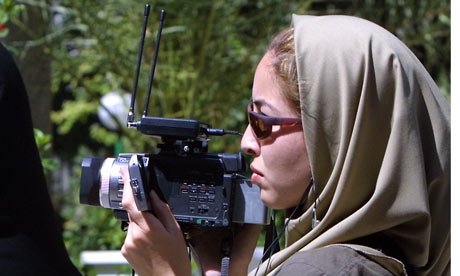Iran jails US journalist Roxana Saberi as spy
Diplomatic row breaks out as Iranian-American reporter Roxana Saberi threatens to go on hunger strike after eight-year sentence
- The Observer, Sunday 19 April 2009
- Article history
An Iranian-American journalist, Roxana Saberi, was sentenced to eight years in prison yesterday by the Iranian authorities after being found guilty of spying for the United States.
The jailing of Saberi - a freelance who has worked for the BBC - seems certain to deepen tensions between America and Iran following indications that, with Barack Obama in the White House, relations might finally be thawing.
The BBC voiced extreme concern at the "severe sentence".

US-Iranian journalist Roxana Saberi, who has just been jailed as a spy in Iran for eight years, taking footage in Tehran. BEHROUZ MEHRI/AFP/Getty Images) Photograph: BEHROUZ MEHRI/AFP/Getty Images
Last night Saberi threatened to go on hunger strike to protest against her conviction. The threat, conveyed by her father, Reza Saberi, follows her conviction after a trial in camera that began last Monday and lasted a single day. "She is quite depressed and wants to go on hunger strike," he said, adding that he was trying to persuade her not to.
The US secretary of state, Hillary Clinton, has demanded that the former Miss North Dakota, who had been working in Iran as a freelance journalist, be released.
Saberi, aged 31, has been held in the notorious Evin prison on the northern edges of Tehran since her arrest. The espionage charges were announced last week. The US said that the allegations were "baseless and without foundation". Saberi, 31, is a citizen of both the United States and Iran, but Tehran does not recognise dual nationality.
"She has been sentenced to eight years ... I will appeal," her lawyer, Abdolsamad Khorramshahi, said. The journalist's parents have travelled to Iran to help win their daughter's release.
The interrogation, charging and trial of Saberi have been played out in a series of short press conferences and statements with Saberi herself, and the officials who heard her case, all but invisible. "Apparently the court has heard her final defence, but I will announce further reports in the next session," spokesman Alireza Jamshidi told reporters last week, according to an Iranian wire service. "She is charged with spying for foreigners. Her case was heard and an indictment has been issued."
Saberi, a graduate of the Northwestern University journalism school who grew up in Fargo, North Dakota, was arrested in late January after living and working in Iran for six years as a journalist, two of them without official accreditation. She has been accused of collecting information from Iranian officials to pass to US intelligence agencies.
According to an earlier statement from the judge, Sohrab Heydarifard: "[Saberi] has been coming and going to certain government circles under the cover of reporter and without a permit. And, through the contacts that she has made with certain employees of these government organisations, she has perpetrated actions to compile and gather information and documents and transferred them to American intelligence services."
According to her family, Saberi herself thought originally that she had been arrested for buying bootleg wine. Last month, however, an Iranian official, Foreign Ministry spokesman Hassan Qashqavi, seemed to suggest that Saberi had been arrested because she had been working in Iran - which tightly controls the media - despite having had her press permit revoked.
The claims of espionage only emerged last week on the eve of her trial. Then Hassan Haddad, deputy chief prosecutor at the Revolutionary Court, claimed that Saberi had admitted the charges.
The Obama administration has said it wants to engage Iran in talks on its nuclear programme and other issues. Iran's hardline president last week said the Islamic republic was also willing to have a new relationship. But on Thursday the State Department said Saberi's jailing was not helpful and that Iran would gain US goodwill if it "responded in a positive way" to the case.

No comments:
Post a Comment